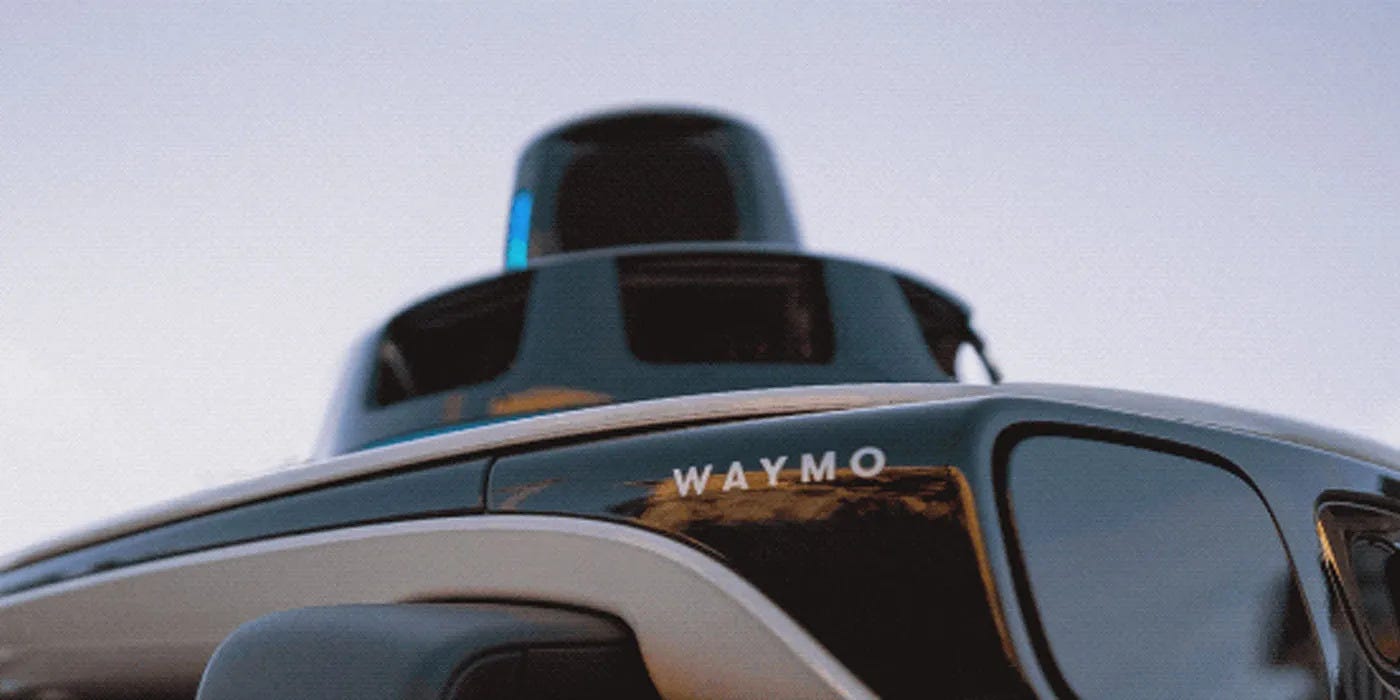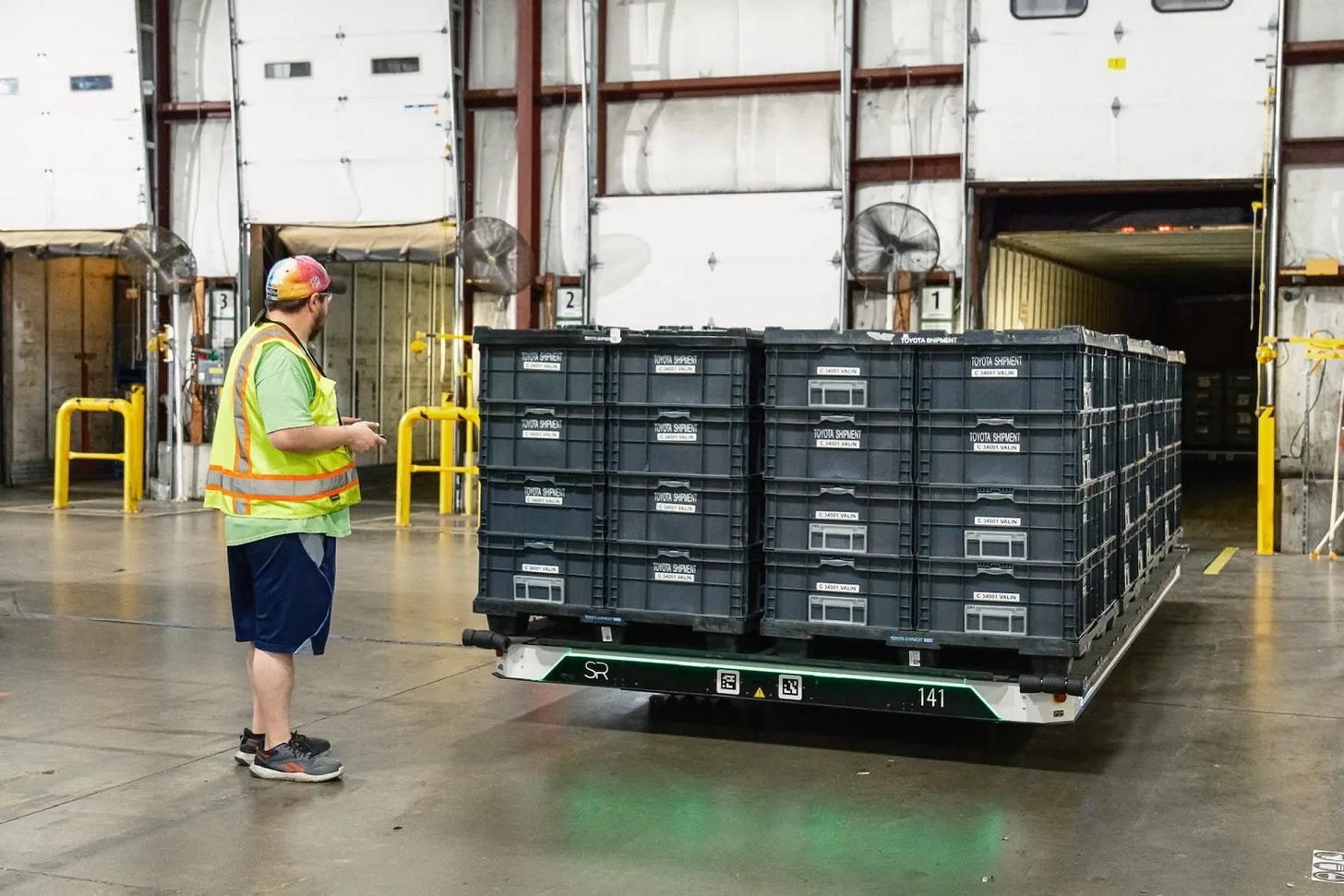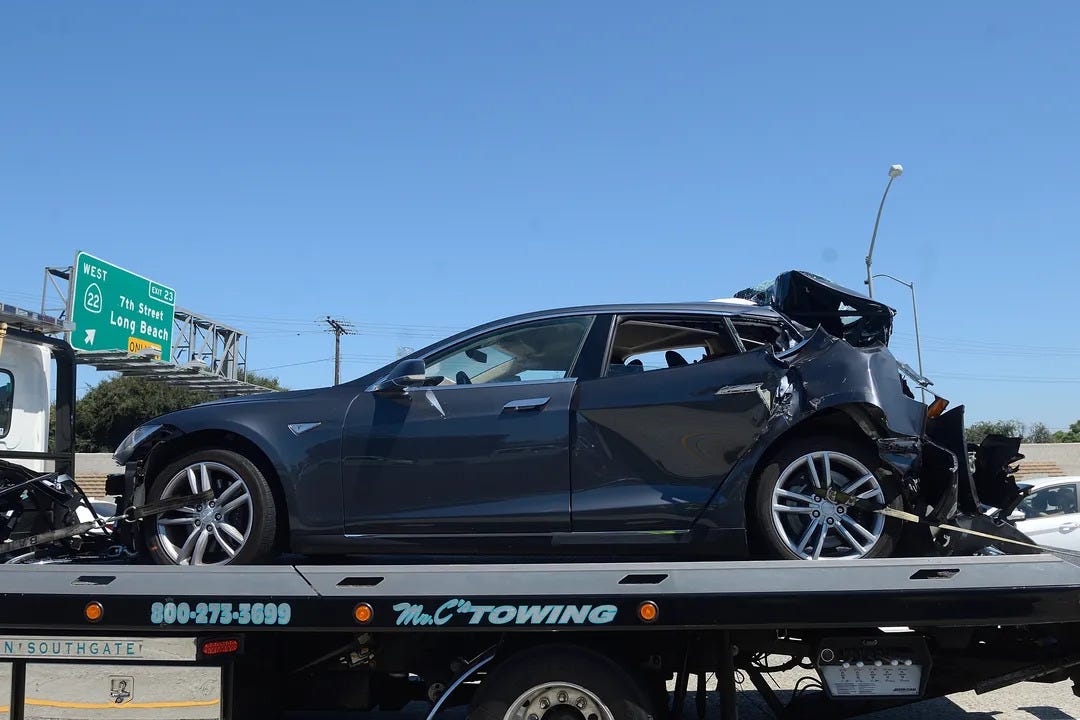Waymo's Robotaxis Prove Safer Than Human Drivers with 88% Fewer Property Damage Claims | December 20th, 2024
Honda unveils new EV prototypes with advanced features for 2026. Lamborghini delays EV launch to 2029, while Lucid Air Pure impresses at $69,900.
Issue [#268] - Every week, we deliver analysis and curation of emerging mobility news - post a job listing here!
Product Launches & Updates
Honda is reviving the Prelude as a hybrid sports coupe, arriving in the US in late 2025. Featuring the debut of Honda's S+ Shift drive mode for enhanced driver engagement, the Prelude pairs two electric motors with an internal combustion engine for efficiency and performance. This marks Honda's focus on hybrids as a bridge to full EVs, aligning with its carbon-neutral goals while capitalizing on its hybrid expertise and market demand | The Verge
Honda will showcase two new EV prototypes from the 0 Series at CES 2025, with a global release planned for 2026. The models highlight Honda's "Thin, Light and Wise" approach, emphasizing advanced features like a proprietary vehicle operating system, automated driving technologies, and Software Defined Vehicles. Honda will also reveal a new energy service aimed at achieving carbon neutrality, marking a significant step in sustainable transportation | Electric Car Reports
According to CEO Stephan Winkelmann, Lamborghini has postponed its first electric vehicle launch to 2029, citing market readiness concerns in the luxury sports car segment. Initially planned for 2028, the EV aligns with Lamborghini's measured approach to electrification. While rivals like Ferrari aim to debut EVs earlier, Lamborghini believes the market for high-performance electric sports cars will mature closer to 2029, ensuring the brand meets expectations for innovation and performance | Reuters
The 2025 Lucid Air Pure offers a luxurious experience at $69,900, combining a sleek design, 420-mile range, and fast charging capability. Its spacious, tech-enhanced interior impresses with features like a curved cockpit and premium sound. However, improvements are needed in voice assistance, navigation, and driver monitoring. With iterative updates and solid performance, the Air Pure remains a strong Tesla Model S competitor, promising future enhancements through over-the-air updates for greater value | TechCrunch
Ridehailing, Carsharing & Delivery
Wing and DoorDash debuted the first drone delivery service in US shopping malls at two Dallas-Fort Worth locations. Customers can order from 50+ stores via DoorDash and receive items within 15 minutes. Drones operate at 65 mph, using a winch system for deliveries. This service enhances DoorDash's capabilities and leverages Wing's expertise, with plans for broader applications after ensuring success at these pilot sites | ZAGDaily
A study by Waymo and Swiss Re shows Waymo's robotaxi platform achieves 88% fewer property damage claims and 92% fewer bodily injury claims than human drivers over 25.3 million autonomous miles. Even against newer vehicles with advanced safety features, Waymo excelled. These findings highlight the platform's strong safety performance, addressing public concerns about autonomous vehicles and reinforcing their potential to enhance road safety significantly | Electrek
Tesla is in talks with Austin officials about launching its autonomous robotaxi fleet, which will potentially start in Texas next year. The company aims to meet safety guidelines and train first responders while evaluating deployment options. Although competitors like GM's Cruise faced setbacks, Tesla's prototype Cybercab highlights its ambition. With fewer regulatory hurdles in Texas, Tesla's plans signal a push for broader adoption of autonomous vehicles despite ongoing public and safety concerns | Bloomberg
General Motors has shut down its Cruise Robotaxi unit following safety issues and financial losses. Meanwhile, Tesla is doubling down on its robotaxi plans, unveiling a new prototype and advocating for deregulated autonomous vehicle policies. This shift highlights two approaches to self-driving tech: fleet-based transportation versus private autonomous vehicles. The contrasting strategies reflect evolving visions for the future of mobility, balancing innovation, regulation, and public acceptance | The Guardian
Grubhub will pay $25 million to settle an FTC lawsuit accusing it of misleading customers, deceiving drivers, and harming unaffiliated restaurants. Allegations include hidden fees, inflated driver pay claims, and unauthorized restaurant listings. The settlement requires Grubhub to disclose full delivery costs, eliminate "junk fees," and restrict false earnings claims. Refunds will go to affected customers, while Grubhub denies wrongdoing, stating the settlement helps the company move forward | The Verge
While US companies like GM and Ford scale back their robotaxi projects, China's Pony.ai is rapidly expanding its fleet from 250 to 1,000 vehicles by 2025. Cheap EVs, supportive regulations, and strong government incentives drive this growth. Despite challenges, China's aggressive approach is positioning it ahead in the robotaxi race, while the US faces regulatory and trade hurdles that may slow its own development in autonomous vehicles | The Verge
Waymo will begin testing its autonomous robotaxis in Tokyo in early 2025, marking its first international expansion. Partnering with GO and Nihon Kotsu, Waymo will map key Tokyo areas and gradually test fully autonomous driving. This move is part of Waymo's global program to refine its technology in diverse environments. The decision follows GM's recent pullback from its robotaxi plans in Japan | TechCrunch
As school districts cut back bus services due to driver shortages, parents are turning to ride-hailing and carpooling apps like Piggyback Network. Founded in Chicago, the app connects parents for shared school commutes. Alternatives like HopSkipDrive and Kango also address transportation gaps, contracting directly with schools. These services emphasize safety and independence for students but highlight a broader challenge: the decline of traditional bus systems and its impact on families | Associated Press
Empower, a ride-hailing start-up challenging Uber and Lyft in Washington, D.C., has grown to claim 10% of the market with 100,000 weekly rides. Offering lower fares and higher driver earnings, Empower operates illegally, refusing to register with regulators. It faces $100 million in fines, a cease-and-desist order, and a lawsuit. Despite risks, Empower plans to expand, sparking debates over safety, legality, and its disruptive business model | The New York Times
Volkswagen Group and PowerCo have invested $48 million in Canadian lithium company Patriot Battery Metals, acquiring a 9.9% stake. The deal secures 100,000 tonnes of lithium concentrate annually for 10 years, supporting PowerCo's battery cell factories in Europe and North America. The partnership aims to enhance ESG standards, explore sustainable lithium supply chains, and advance Patriot's Shaakichiuwaanaan Project, one of the largest lithium resources in the Americas, ensuring long-term raw material security | Electric Cars Report
Investment & Deals
Toyota has received a $4.5 million grant from the US Department of Energy to improve EV battery sustainability. Led by the Toyota Research Institute of North America, the project focuses on automating battery disassembly, recycling, and extending material life. Partnering with Oak Ridge and National Renewable Energy Laboratories, it aims to reduce waste and create a "3R facility" for reuse, recycling, and refurbishing batteries. This innovation supports a more sustainable, circular EV battery supply chain | Electrek
Ford's joint venture, BlueOval SK, secured a $9.63 billion DOE loan to build three advanced EV battery plants in Tennessee and Kentucky. These factories will produce over 120 GWh of batteries annually, supporting Ford's EV growth and creating 7,500 jobs. The largest loan under the ATVM program, it highlights the Biden administration's focus on domestic EV manufacturing and aligns with the goal of making half of US vehicle sales zero-emission by 2030 | Electrek
Czech hybrid VTOL developer Zuri secured €3 million in pre-Series A funding totaling €4.4 million to accelerate its next-gen aircraft development. Founded in 2017, Zuri focuses on sustainable mid-range air travel using hybrid VTOL technology powered by Sustainable Aviation Fuel. The funds will advance its TD 2.0 demonstrator, featuring a hybrid powertrain, tiltrotor capability, and improved design. Led by Pale Fire Capital, the round supports Zuri's mission to redefine VTOL mobility | Tech.eu
German aircraft maker VÆRIDION raised €14 million, led by the World Fund, to advance its zero-emission Microliner prototype. Aimed at affordable regional flights by 2030, the nine-seater aircraft integrates advanced battery-wing technology for quiet, efficient travel. Certification is underway, with prototype flights set for 2027. Partnerships include Denmark's Copenhagen AirTaxi and Germany's Aero-Dienst. The funds will accelerate development, expand the team, and support plans for consumer and air ambulance applications | Tech.eu
Slip Robotics secured $28 million in Series B funding, led by DCVC, to expand its robotic platform to load a truck in just five minutes. Founded in 2020, the Atlanta-based company offers a robot-as-a-service model with SlipBots, capable of carrying 12,000 pounds. Serving customers like John Deere and Nissan across 25+ sites, Slip plans to use the funds to scale operations, hire staff, and enhance its innovative logistics solutions | TechCrunch
Slip Robotics secured $28 million in Series B funding, led by DCVC, to expand its robotic platform to load a truck in just five minutes. Founded in 2020, the Atlanta-based company offers a robot-as-a-service model with SlipBots, capable of carrying 12,000 pounds. Serving customers like John Deere and Nissan across 25+ sites, Slip plans to use the funds to scale operations, hire staff, and enhance its innovative logistics solutions | TechCrunch
South Korea's antitrust watchdog has fined Kakao Mobility $10.5 million for restricting competitors' access to its taxi-hailing app, down from an initial $50.3 million. The company allegedly demanded fees or sensitive data from rivals like Uber and TADA to maintain dominance, growing its market share to 96% by 2022. Kakao plans to contest the decision, emphasizing support for fair competition while facing separate fines for suspected accounting fraud | TechCrunch
Honda and Nissan are discussing a potential merger to address challenges in the electric vehicle (EV) market, including competition from Tesla and BYD. The plan involves creating a joint holding company, which may include Mitsubishi. With earnings down 90% in 2024, Struggling Nissan seeks stability through collaboration. Honda aims to expand its EV lineup, including the Honda Zero platform. This partnership could bolster their position in the rapidly evolving global EV industry | The Verge
Cities & Policy
Quebec has passed a law banning the sale of gasoline-powered vehicles starting in 2035, with stricter rules than Canada's national plan. The law also prohibits hybrids and plug-in hybrids. Quebec, leading Canada in EV registrations, benefits from strong government incentives and a renewable energy grid. The law aims to phase out combustion engines entirely by 2035, with potential adjustments based on market progress, making Quebec a key player in the EV transition | Electrek
The Trump administration is considering eliminating a rule requiring automakers, including Tesla, to report crashes involving autonomous and driver-assist systems. This rule, which has led to scrutiny of Tesla's Autopilot, aims to increase transparency on the safety of new technologies. Scrapping it would benefit Tesla, which has reported the most crashes under this rule. The change could reduce regulatory pressure and support Tesla's push for more autonomy in vehicles | The Verge
The EPA has approved California's plan to ban most new gas and diesel cars by 2035. The phase-out will start in 2026, requiring 35% of car sales to be zero-emissions vehicles, rising to 68% by 2030 and 100% by 2035. The incoming Trump administration could reverse the decision, which had previously revoked California's emissions standards. Sixteen other states have adopted similar plans to phase out fossil fuel vehicles | TechCrunch
Safe parking programs offer temporary shelter and support to people experiencing homelessness by providing secure overnight parking spaces. These programs, active in cities like Duluth and Los Angeles, offer resources like sanitation, Wi-Fi, and social services, helping individuals regain stability. While not a long-term solution, they provide critical support, especially for those who have some income but need assistance transitioning to permanent housing | Smart Cities Dive
New Products, Features, and Data Points
Rivian's latest software update brings YouTube, Google Cast, and SiriusXM to its R1S and R1T vehicles. These apps, available while parked, enhance the in-vehicle experience. Google Cast lets owners stream over 3,000 apps to the center console screen. The update also includes features like scheduled climate control and improved highway assist, aimed at boosting comfort during long charging sessions and improving the overall driving experience | TechCrunch
GM and ChargePoint are partnering to install up to 500 fast EV chargers under the GM Energy brand by the end of 2025. The stations feature ChargePoint's Express Plus platform for charging speeds up to 500kW and Omni Port hardware, which are compatible with CCS and Tesla's NACS ports. This initiative is part of GM's broader efforts to expand EV charging infrastructure, including collaborations with EVgo and Flying J | The Verge
If you liked this post from Movements, why not share it? Forward it to a friend and we'll send you some sweet karma!




